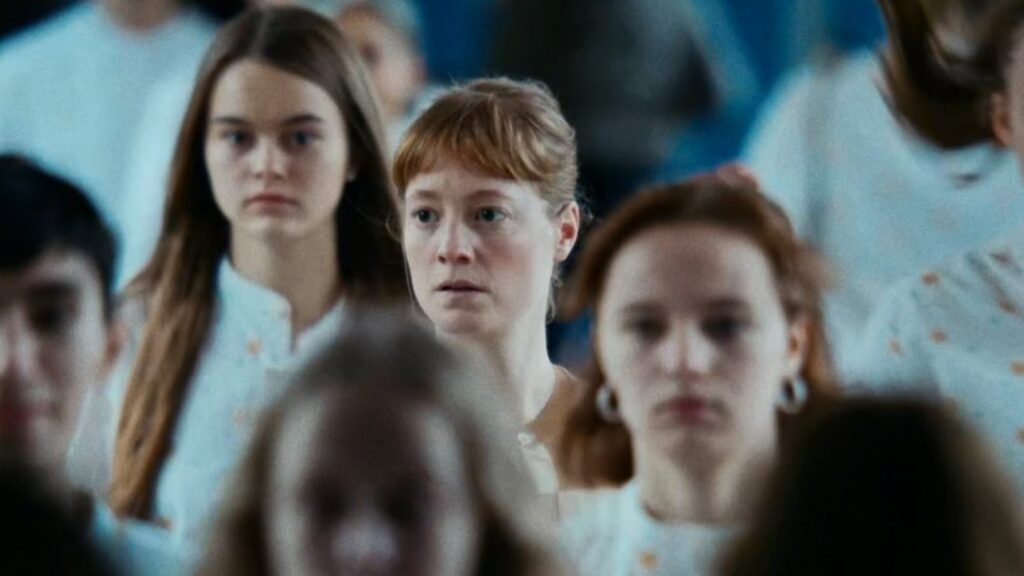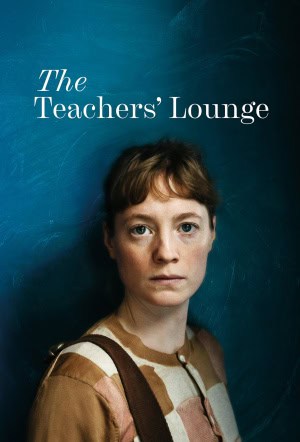The Teachers’ Lounge – Snapshot
The Teachers’ Lounge develops in a German middle school where a young and committed math teacher learns that the strict rules governing mathematical proofs break down in the real world of different viewpoints and cultural identities. It very successfully develops intense feelings of anxiety, but has multiple unnecessary diversions and a very unsatisfying finish. (3*)
Where to Watch:
Stream:Netflix
Rent: Prime/Apple/YouTube/Fandango/Google ($6)
The Teachers’ Lounge – The Oscar Buzz
Oscar Nominations (1) / Oscar Wins (0) :
International Feature (Germany)
The Teachers’ Lounge is this year’s International Feature film from Germany. It is a fairly low-budget movie filmed almost entirely at a school in Hamburg, Germany. The only project I could find that links any of the mostly-German crew and cast was a German television show Tatort which I haven’t seen. Director and co-writer, Ilker Catak, and the costume designer, also worked together on a movie (that I also haven’t seen) – I Was, I Am, I Will Be. So, bottom-line, is that I am not familiar with any of the people involved in this movie. The only Oscar connection I could find was that a sound team member, Wolfi Muller, also worked on Never Look Away, another Foreign Language film from Germany also nominated for cinematography. In short, this is a film from a young and relatively unacknowledged team, at least in the U.S.
I do want to give a shout out to Leonie Benesch, the young actress playing the main character in this movie, Carla Nowak. She shows remarkable presence and ability to handle rapidly changing emotional tones, from compassion for her students to frustration, anxiety, and anger with her colleagues. I suspect we will be seeing more of her.
The Teachers’ Lounge is directed and co-written by a 40-year-old (i.e. young) German, Ilker Catak. His co-writer was Johannes Duncker, who I don’t believe is much older. I must confess, however, that I am unaware of any of their other work. I should also acknowledge the short, but tension-filled soundtrack from young composer Marvin Miller, and the tight, geometric filming style from cinematographer Judith Kaufmann, both of which enabled a consistent and increasing level of anxiety. Good work!
The Teachers’ Lounge – Related Movies
I Was, I Am, I Will Be: (Direction, Screenplay, Costumes)
Tatort (German TV series): (Direction, Benesch)
Never Look Away: (Sound)
The Teachers’ Lounge – What Others Think
Unlike our last two International Features, Io Capitano and Perfect Days, the viewing public didn’t particularly like this film, rating it at the bottom of our five international features and 34th out of all 38 films. One viewer wrote that he “Can’t really understand the high praise”. And another described The Teachers’ Lounge as an “Unrealistic and boring depiction of the school system.”
Critics, however, ranked the movie tenth out of all thirty eight of this year’s Oscar-nominees, tying it with such critical standouts as Poor Things, The Holdovers, and Godzilla Minus One. In fact, according to my rating scales, The Teachers’ Lounge generated the largest difference between critics and audiences of any movie on this year’s list – critics loved it, audiences not so much.
Critics generally found the film’s strengths in how it created so much tension out of what should be normal, everyday, life. Matt Zoller Seitz (Roger Ebert) notes “It’s not easy to make an intense thriller about things that happen every day. But when one appears, it’s glorious.” And concludes that the director and writers “Catak and Duncker have tapped into a largely unexplored subcategory of thriller, one with unlimited potential to illuminate everyday life.” Seongyong Cho (also Roger Ebert) echoes that The Teachers’ Lounge is “…a riveting school drama about how one seemingly simple matter becomes quite complicated for everyone involved.” Alissa Wilkinson (New York Times) gave the film a Critics Pick and found its grounding in a simple school setting “…despite its realism, is strongest on the allegorical level.” To extend the allegory, Wilkinson concludes “A society is not very easy to keep in harmony, and a fully democratic attempt to keep the peace in any group is bound to result in a tug of war between authoritarian and even fascist principles on the one hand and unfettered chaos on the other.” It is possible, I think, that it is the critics’ penchant for seeing bigger themes in movies that general viewers might not be interested in. That may very well produce such big differences in opinions about The Teachers’ Lounge.
Despite positive critical reviews, the overall rating pulled this film down to 23rd out of all 38 of this year’s films, tied with Barbie, among others. (Just for the record, I thought Barbie was a much better film!)
The Teachers’ Lounge – Special Mention
German Movies at the Oscars – The Oscars and general movie life are getting much more international as our globe shrinks. This year, for example, a German film, Anatomy of a Fall, received multiple nominations, including for Best Picture. I wondered what the general history is for German movies at the Oscars and doing some minimal research, I found some interesting facts.
German films have a long and consistent history at the Oscars. In the International/Foreign film category, German films have been nominated 22 times, starting in 1956, and have won four times including, most recently, for All Quiet on the Western Front. German documentaries have been nominated 13 times and won that Oscar four times with CitizenFour (2014) the most recent. And German movies have been nominated 17 times for Best Picture and won once in 1937 for The Life of Emile Zola.
Individuals with German citizenship have received nominations in just about every category and have won individual Oscars several times. Acting nominations date all the way back to the early years of the Oscars, almost a century ago, with a leading actor win for Emil Jennings in the 1928/29 Oscars. Louise Rainer, a German citizen, won Leading Actress for The Great Ziegfeld and again a year later for The Good Earth. Christoph Waltz won Supporting Actor twice for Inglorious Basterds (2009) and Django Unchained (2012). German-born Mike Nichols won best director for The Graduate (1967). Clearly Germany has a long and continuous history at the Oscars, so it isn’t surprising to see two German films in the running this year, including The Teachers’ Lounge.
The Teachers’ Lounge – Michael’s Moments
The Teachers’ Lounge is an uneven movie with some great ideas but also some serious flaws. Movies like this are the hardest to review because “on the one hand…and on the other…”. So let’s start with what works.
The best aspect of this movie is in how it increasingly builds tension. You don’t expect so much initially – it is a movie set, and filmed, in a German middle school. The major character, Carla Nowak, is new to the school and, given her youthful appearance, probably to teaching. She teaches math and physical education to a class of 12-year olds. Played by Leonie Benesch, her character is German born, but of Polish parents and that mixture of nationalities becomes important in how she both sees and is seen by her students, her colleagues, and the student’s parents. Cultural identities become important in understanding how people view and treat each other.
Almost immediately into The Teacheers’ Lounge, we learn that there has been a theft of some kind. Her math class, where she is trying to explain the principles of proof versus assumption, is interrupted by three administrators who zero in on male students and proceed with a rather stark and direct interrogation which, clearly, Carla disapproves of. The allegations against a specific student end up based on evidence that ends up being rather shaky. From that point, Carla is left in an intensely anxious environment, torn between protecting her students, fighting cultural prejudices, and feeling abandoned and even antagonized by her colleagues.
The film does well in slowly developing the sense of angst. The soundtrack is one of sharp string plucks and strokes yielding high tension. The cinematography takes advantages of the precise geometry of the school as a foil against the very imprecise charges and countercharges being thrown about. And the decision to use a 1.33:1 aspect ratio further constrains the viewpoint and increases an almost claustrophobic feeling. Benesch gives Carla a committed but increasingly uncertain feeling about her own reality that is very convincing – you feel the same anxiety that she does.
And yet, The Teachers’ Lounge ultimately sort of fizzles. There are scenes that seem to introduce themes and questions that ultimately go nowhere. Why, for example, at the very beginning of the movie, does she write a phone number on her hand? A minute is dedicated to that action and then it is never brought up again. (I’ve seen this happen a lot in movies, like this one, where the filmmakers are much more experienced in television than feature films. Television is a medium where themes can be inserted in an episode but don’t come into play until future episodes, however you don’t have that luxury in a feature film, unless you have already booked several sequels!). There is another scene about an hour into the movie where Carla seems to be experiencing a massive hallucination. I suppose it is there to reinforce her increasing self doubts about what she thinks she knows – challenging her notion of proof. But it also doesn’t go anywhere and the idea could have been made better with more displays of her increasing anxiety.
Then there is the totally unsatisfying ending to The Teachers’ Lounge. I am not going to give that away, but the ending really resolved nothing and leaves the audience more than a little frustrated. I suppose that might have been Catak’s intent – reinforcing the ambiguity of the situation – but it also seemed like a cop-out and leaves us with no idea what happens next – sort of a fill in your own blank! Like Io Capitano, The Teachers’ Lounge has a dud ending.
So despite some marvelous acting, tension-filled music, and astute cinematography, the script and direction for this film are ultimately disappointing. Watch it if you have nothing better to view! (3*)


